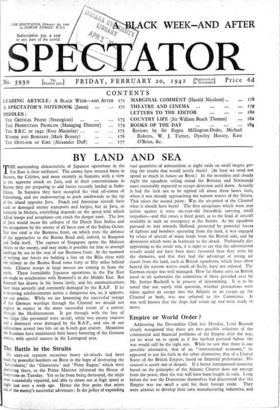The Battle in the Straits
On sixty-six separate occasions heavy air-attacks had been made by powerful bombers on Brest in the hope of destroying the Scharnhorst,' the Gneisenau ' and ' Prinz Eugen,' which were sheltering there, so the Prime Minister informed the House of Commons on Tuesday. Yet so far from being destroyed, the ships Were successfully repaired, and able to steam out at high speed at night just over a week ago. Hence the first point that arises out of the enemy's successful adventure : Is the policy of expending
vast quantities of animunition in night raids on small targets get- ting the results that would. justify them? (At least we need not spend so much in future on Brest.) In the moonless and cloudy night the squadron sailing round the Brittany and Normandy coast _reasonably expected to escape detection until dawn: Actually it had the luck not to be sighted till about three hours later, when it was already approaching the narrow waters of the Straits. That raises the second point : Was the air-patrol of the Channel what it should have been? The first aeroplanes which went into action against it were six-year-old Swordfish carrying small torpedoes—and this raises a third point, as to the kind of aircraft available in such an emergency at ,the Straits. As the squadron pursued its Way towards Holland, protected by powerful forces of fighters and bombers operating from the land, it was engaged by relays of aircraft of many kinds from the British side, and by destroyers which went in fearlessly to the attack. Profoundly dis- appointing as the result was, it is right to say that the adventurous vessels could not have been more favoured than they were by the elements, and that they had the advantage of strong air escort from the land, such as British squadrons, which have often braved the narrow waters south of Sicily, have not enjoyed. The German escape was well managed. How far blame rests on British naval or air authorities the committee of three presided over by Mr. Justice Bucknill is in process of determining. It is to be noted that one surely vital question, whether precautions were taken against an escape into the Atlantic or an escape up :he Channel or both, was not referred to the Committee. It was well known that the ships had steam up and were ready to move.


























